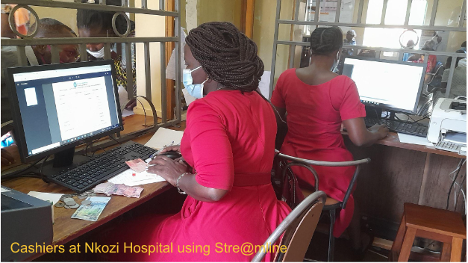Nkozi Hospital is a Private Not for Profit (PNFP) Hospital owned by Kampala Archdiocese. It was founded by the White Sisters of Our Lady of Africa from the Netherlands in 1942. The Hospital enjoys good collaboration with the Government of Uganda and the Hospital serves as the referral health facility for Mawokota South Health Sub-District. The hospital is accredited by Uganda Catholic Medical Bureau (UCMB).
Challenges
Data silos causing duplication and misplacement of data
We were using 4 different systems: Quickbooks, Medical Audit, RX solutions and the paper based system. Inter-system reconciliation of data was tedious. Data was being lost in the many existing data entry platforms. Entries made on the stock cards (for example) and some sundries used in the inpatient department, were not reflected in the Medical Audit system and neither were they reflected in the Quickbooks financial system. It was not possible to retrieve previous records in the Laboratory department. The lab system was losing records every 24 hours. In order to avoid this problem, the users had improvised by double recording the same data into another book for future reporting. This created enormous data gaps that made reconciliation very difficult.
Quality of reports generated
Nkozi Hospital was compliant to reporting requirements from the Ministry of Health through the DHO’s office, UCMB and their own internal reports. The hospital was required to submit these reports periodically either monthly, Quarterly or bi-annually. In this analysis, it was discovered that;
- The report compilation process was the most dreaded task by all assigned parties. It was reported to be tedious and time consuming. On many occasions the reports were submitted past the required timeline.
- There was no confidence in or any basis to prove that the generated reports accurately represented the operations of the hospital. The reporting team confirmed that reporting from the manual HMIS books using the tallying method was highly susceptible to errors of omission.
- The departmental reports were compiled by 2 parties; by departmental heads as well as the records department. This was so to allow the comparison of 2 reports in the move to minimize errors. The compilation of the same report twice is a misuse of the Hospital’s human resource and a waste of time that could rather be spent focusing on healthcare.
Actions Taken
- Stre@mline team installed Stre@mline EMR at Nkozi Hospital on the 16th May 2022.
- A total of 57 staff members including: the administrators, finance team, clinical team, records teams were trained in a period of four weeks.
- The Nkozi Hospital team were able to set up its price lists, run stock count and stock reconciliations in both the store and pharmacy, etc on Stre@mline.
- Hospital went live with Stre@mline EMR on the 17th June, 2022 and all OPD staff switched to the Stre@mline EMR.
Results:
As of 20th December, 2022, Nkozi hospital had registered a total number of 8,541 patients on Stre@mline EMR.
According to Dr. Chriscent Tuhaise, the Hospital Medical Director, "Stre@mline EMR has made it easier for the hospital to track the usage of its supplies. Stre@mline can also tell us how much stock in terms of value that the hospital has at a given period of time. I have used many systems but Stre@mline is the best as far as stock management is concerned."
According to Sr. Susan the accountant, Stre@mline has made it easier for the hospital to manage its budget. Staff are able to see exactly how much money is being spent on supplies, medications, and other expenses. This has helped the hospital to identify areas to cut costs and make more efficient use of resources.
According to Sylivia Tugume, the issue of drug stock outs and refunds is now history. This was a common issue while using the previous systems but now, Stre@mline informs the clinician when the drugs are out of stock or even expired.

